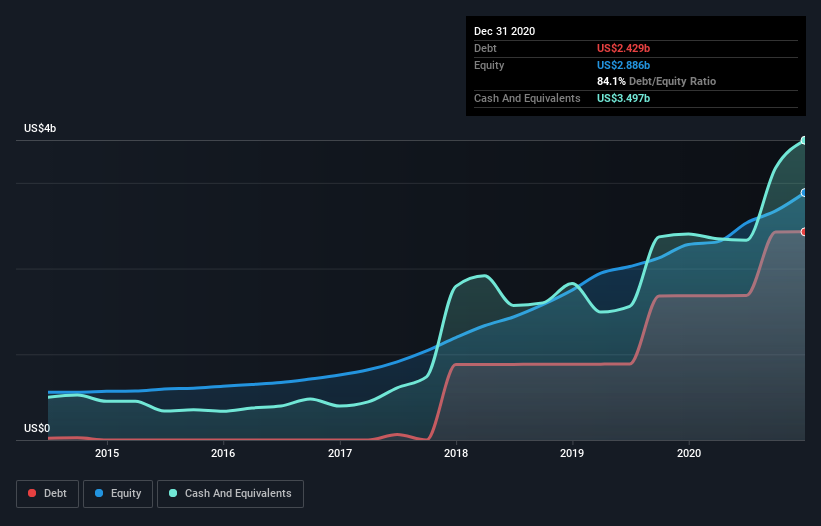- United States
- /
- Interactive Media and Services
- /
- NasdaqGS:WB
We Think Weibo (NASDAQ:WB) Can Stay On Top Of Its Debt
Some say volatility, rather than debt, is the best way to think about risk as an investor, but Warren Buffett famously said that 'Volatility is far from synonymous with risk.' So it seems the smart money knows that debt - which is usually involved in bankruptcies - is a very important factor, when you assess how risky a company is. We can see that Weibo Corporation (NASDAQ:WB) does use debt in its business. But is this debt a concern to shareholders?
Why Does Debt Bring Risk?
Debt and other liabilities become risky for a business when it cannot easily fulfill those obligations, either with free cash flow or by raising capital at an attractive price. Ultimately, if the company can't fulfill its legal obligations to repay debt, shareholders could walk away with nothing. While that is not too common, we often do see indebted companies permanently diluting shareholders because lenders force them to raise capital at a distressed price. By replacing dilution, though, debt can be an extremely good tool for businesses that need capital to invest in growth at high rates of return. When we examine debt levels, we first consider both cash and debt levels, together.
See our latest analysis for Weibo
What Is Weibo's Debt?
As you can see below, at the end of December 2020, Weibo had US$2.43b of debt, up from US$1.68b a year ago. Click the image for more detail. But on the other hand it also has US$3.50b in cash, leading to a US$1.07b net cash position.

How Strong Is Weibo's Balance Sheet?
Zooming in on the latest balance sheet data, we can see that Weibo had liabilities of US$958.4m due within 12 months and liabilities of US$2.49b due beyond that. Offsetting these obligations, it had cash of US$3.50b as well as receivables valued at US$1.24b due within 12 months. So it actually has US$1.29b more liquid assets than total liabilities.
This short term liquidity is a sign that Weibo could probably pay off its debt with ease, as its balance sheet is far from stretched. Succinctly put, Weibo boasts net cash, so it's fair to say it does not have a heavy debt load!
On the other hand, Weibo's EBIT dived 15%, over the last year. We think hat kind of performance, if repeated frequently, could well lead to difficulties for the stock. When analysing debt levels, the balance sheet is the obvious place to start. But it is future earnings, more than anything, that will determine Weibo's ability to maintain a healthy balance sheet going forward. So if you want to see what the professionals think, you might find this free report on analyst profit forecasts to be interesting.
Finally, a business needs free cash flow to pay off debt; accounting profits just don't cut it. While Weibo has net cash on its balance sheet, it's still worth taking a look at its ability to convert earnings before interest and tax (EBIT) to free cash flow, to help us understand how quickly it is building (or eroding) that cash balance. Over the last three years, Weibo actually produced more free cash flow than EBIT. That sort of strong cash conversion gets us as excited as the crowd when the beat drops at a Daft Punk concert.
Summing up
While it is always sensible to investigate a company's debt, in this case Weibo has US$1.07b in net cash and a decent-looking balance sheet. The cherry on top was that in converted 103% of that EBIT to free cash flow, bringing in US$707m. So is Weibo's debt a risk? It doesn't seem so to us. When analysing debt levels, the balance sheet is the obvious place to start. However, not all investment risk resides within the balance sheet - far from it. For example, we've discovered 4 warning signs for Weibo that you should be aware of before investing here.
If you're interested in investing in businesses that can grow profits without the burden of debt, then check out this free list of growing businesses that have net cash on the balance sheet.
If you decide to trade Weibo, use the lowest-cost* platform that is rated #1 Overall by Barron’s, Interactive Brokers. Trade stocks, options, futures, forex, bonds and funds on 135 markets, all from a single integrated account. Promoted
Valuation is complex, but we're here to simplify it.
Discover if Weibo might be undervalued or overvalued with our detailed analysis, featuring fair value estimates, potential risks, dividends, insider trades, and its financial condition.
Access Free AnalysisThis article by Simply Wall St is general in nature. It does not constitute a recommendation to buy or sell any stock, and does not take account of your objectives, or your financial situation. We aim to bring you long-term focused analysis driven by fundamental data. Note that our analysis may not factor in the latest price-sensitive company announcements or qualitative material. Simply Wall St has no position in any stocks mentioned.
*Interactive Brokers Rated Lowest Cost Broker by StockBrokers.com Annual Online Review 2020
Have feedback on this article? Concerned about the content? Get in touch with us directly. Alternatively, email editorial-team (at) simplywallst.com.
About NasdaqGS:WB
Through its subsidiaries, operates as a social media platform for people to create, discover, and distribute content in the People’s Republic of China.
Flawless balance sheet and undervalued.
Similar Companies
Market Insights
Community Narratives



